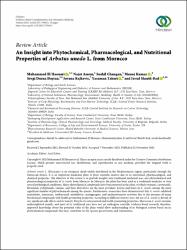An Insight into Phytochemical, Pharmacological, and Nutritional Properties of Arbutus unedo L. from Morocco

Date
2021Author
Durna Daştan, SevgiElHaouari, Mohammed
Assem, Najat
Changan, sushil
Kumar, Manoj
Rajkoviç, Jovana
tahari, yasaman
Rad, Javad sharifi
Metadata
Show full item recordAbstract
Arbutus unedo L. (Ericaceae) is an evergreen shrub widely distributed in the Mediterranean region, particularly through the
Moroccan forests. It is an important medicinal plant of great scientific interest due to its nutritional, pharmacological, and
chemical properties. -e objective of this review is to provide insights into traditional medicinal uses and phytochemical and
pharmacological properties of A. unedo from Morocco. In Morocco, the plant has been used as a traditional medicine to treat
several pathological conditions. Many phytochemical compounds have been reported in the plant, of which vitamins, carotenoids,
flavonoids, polyphenols, tannins, and their derivatives are the most prevalent. Leaves and fruits of A. unedo contain the most
significant number of phytochemicals among the species. Furthermore, researchers have demonstrated that A. unedo exhibited
antioxidant, anticancer, antibacterial, antidiabetic, antiaggregant, and antihypertensive activities due to the presence of many
biochemical compounds with health-promoting properties. According to different toxicity tests, the use of A. unedo is devoid of
any significant side effects and/or toxicity. Despite its nutraceutical and health-promoting properties, Moroccan A. unedo remains
underexploited mainly, and most of its traditional uses have not yet undergone scientific evidence-based research; therefore,
improved knowledge about the potential value of the plant would allow understanding of its biological activity based on its
phytochemical compounds that may contribute to the species preservation and valorization. Arbutus unedo L. (Ericaceae) is an evergreen shrub widely distributed in the Mediterranean region, particularly through the
Moroccan forests. It is an important medicinal plant of great scientific interest due to its nutritional, pharmacological, and
chemical properties. -e objective of this review is to provide insights into traditional medicinal uses and phytochemical and
pharmacological properties of A. unedo from Morocco. In Morocco, the plant has been used as a traditional medicine to treat
several pathological conditions. Many phytochemical compounds have been reported in the plant, of which vitamins, carotenoids,
flavonoids, polyphenols, tannins, and their derivatives are the most prevalent. Leaves and fruits of A. unedo contain the most
significant number of phytochemicals among the species. Furthermore, researchers have demonstrated that A. unedo exhibited
antioxidant, anticancer, antibacterial, antidiabetic, antiaggregant, and antihypertensive activities due to the presence of many
biochemical compounds with health-promoting properties. According to different toxicity tests, the use of A. unedo is devoid of
any significant side effects and/or toxicity. Despite its nutraceutical and health-promoting properties, Moroccan A. unedo remains
underexploited mainly, and most of its traditional uses have not yet undergone scientific evidence-based research; therefore,
improved knowledge about the potential value of the plant would allow understanding of its biological activity based on its
phytochemical compounds that may contribute to the species preservation and valorization.














